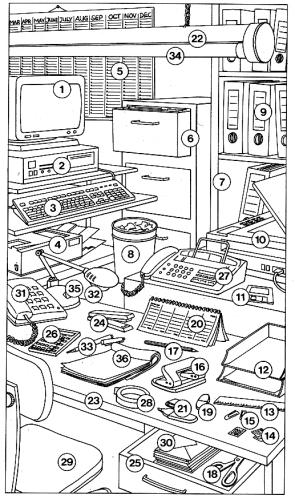Ready to write – letters, fax messages, e-mails (1)
Peter ist zu einem mehrwöchigen Praktikum in einem Betrieb in Großbritannien. Um mehr über Geschäftskorrespondenz zu erfahren, beobachtet er Diane, die Sekretärin, bei der Büroarbeit. Da spricht ihn sein Kollege James an und zeigt ihm einen Brief, den er erhalten hat.
Diane: “Writing letters in English must be quite different from how you compose letters in German, Peter?”
Peter: “There are small points of difference, but the general style is very similar. I had expected much less formality in English, but the rules are really just as rigid as in German.”
Steve: “You´re right about formality and rules. But they´re really only a cover, you know – I´ll give you an example. Look at this letter I got this morning from my local council … “
“Dear Sir,
It has been brought to our attention that you are parking your car illegally on council ground at the end of Lansdowne Drive, Wimbledon. Although the land has not yet been fenced off there are two notices making it very clear that parking is prohibited. You have been observed on several occasions parking your car on this ground at night and driving your vehicle away the next morning before our parking wardens take up their duty. For security reasons, even night-time parking is prohibited. Hence, we must ask you kindly to refrain from parking your car on this terrain in the future. Failure to comply with our request will result in legal action having to be taken against you.
Yours faithfully,
Edmond Tracey,
Town Clerk”
Diane: “So why are you getting so het-up, Steve? It seems like an open-and-shut case to me.”
Steve: “No. That´s not it. Look at the style of that letter. They´re basically telling me: `Hey, you berk, stop parking your lousy car on our ground´. But this guy Tracey wrapped the brick up in fancy paper.”
Diane: “Oh, come on, Steve. He´s just being polite.”
Steve: “Yes, in that typically English way where it means zilch.”
Peter: “Well, I don´t want to take sides here, but official letters like that are also couched in polite terms in Germany.”
Diane kann Steve zu einem freundlichen Antwortbrief überreden. Können Sie die Lücken darin füllen?
“Dear Mr Tracey,
Thank you for your letter of June 4. I am sorry you have had ….. to ….. me that I have been illegally parking on council land. In my ….. , I must say that I was ….. that the land ….. belonged to the council. I certainly saw no notices ….. parking. I had ….. that at night at least the land could be ….. to park cars on. If this is not true, I shall of course ….. from parking my car there in future. But may I take this ….. to ….. for more car-parking possibilities in Lansdowne Drive and the ….. .
Yours sincerely
Steve Blackwood”
vicinity, opportunity, in question, cause, appeal, refrain, inform, used, unaware, prohibiting, assumed, defence.
Do´s and Don´ts – a matter of form
When writing a formal business letter, the correct form of address is: Dear Sir or Dear Madam. The customary plural is: Dear Sirs/Mesdames.
If you are writing a business letter to a person you know by name then you may now begin your letter in the following way: Dear Mr (Smith, Brown). Difficulty is encountered by the British (and Americans) when a woman is addressed. If you are replying to a letter written by a woman who gave her name as Mrs then you can safely address her as: Dear Mrs (Smith, Brown). A big problem arises when you have to reply to a letter signed simply with surname and first name – Joan Brown, for instance. Under no circumstances can you address her as Miss Brown. In the United States, that problem was solved by inventing a new form – Ms – and this also won wide acceptance now in Britain. So, replying to a letter signed by Joan Brown, you can safely address her as Ms Brown. Another alternative in use is to address her as: Dear Joan Brown.
Titles must always be used: Dear Lord Salisbury, Dear Sir John (here the surname is dropped!). Dear Dr. Linklater, Dear Professor Maugham. Senior military ranks are also usually in formal letter writing: Dear Major Rigby.
And now – how do you end a letter?
Yours sincerely or Yours faithfully? The British use a simple rule in deciding whether to end a business letter with “sincerely” or “faithfully”. If the letter begins with a “Dear Sir” they avoid employing a further “S” by ending the letter “Yours faithfully”. The same rule applies if the letter begins “Dear Madam” or “Dear Sirs/Mesdames”.
“Yours sincerely” is reserved for letters addressed to persons by name: “Dear Mr Smith, Dear Mrs Brown” etc. The form “Yours truly” is now found almost exclusively on letters sent by fax or electronic mail. The British have an almost limitless list of ways of ending letters addressed to persons by their first name: Dear John … with best wishes, with kind regards, with regards, all the best, …
Sending letters by Post
In Great Britain there are different possibilities to send letters. Can you find the correct explanation for these examples?
- Registered post a) The recipient signs for the letter. b) The sender receives a receipt confirming the letter has seen sent. c) A description of the letter´s contents is officially registered.
- Recorded delivery a) The sender must sign a declaration assuming responsibility for the letter´s delivery. b) The Post Office takes responsibility for the safe delivery of the letter. c) The recipient signs an official receipt confirming acceptance of the letter.
Parts of the texts/examples found in: „Fit for Business English“, Aufl. 2001, Compact Verlag, München
More questions and exercises
Which of the expressions listed below match together?
Which of the phrases resp. expressions listed below match together?
Abbreviations
Do you know the “secret” of abbreviations used in letters etc. ?
Office equipment
Look at figure 73.1. !
- a) Name at least 15 of the 35 items shown there!
- b) Give the numbers of the articles / objects listed below!
envelope ( ),
file ( )
tray ( )
bin ( )
stapler ( )
holepunch ( )
marker pen ( )
paper clip ( )
part of the exercises and examples found in: QuickCheck Büroenglisch, 1. Aufl. 1995, Klett Verlag, Stuttgart
For an example of a formal letter and the “survival-kit” for business letters, faxes and e-mails see next issue!
Teilen:















